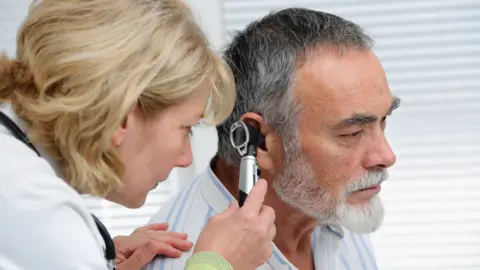Deaf access to NHS progress 'too slow', charity warns
 AlexRaths/Getty Images
AlexRaths/Getty ImagesThere is still a long way to go before deaf patients get the increased accessibility to NHS Wales that they were promised, a charity has warned.
There has been some progress since standards were introduced in 2014.
But Action on Hearing Loss said people who are deaf or have hearing loss are still being forced to use the phone or go to their GP surgery in person.
The Welsh Government said it recognised there was "more to be done to address the remaining barriers".
The charity, formerly known as the RNID, had responses from more than 300 people to a survey.
Findings include:
- More than a third visit their GP surgery in person to book appointments but only 17% said they prefer to book in this way
- More than a quarter ask a family member, friend or support worker to call their GP surgery on their behalf
- Around a quarter experienced difficulties booking urgent same-day appointments or getting urgent medical advice when their surgery was closed
- More than half said doctors or nurses did not check they had understood what had been said
- More than a third said doctors or nurses did not speak clearly or spoke too quickly
The charity said progress includes the introduction of technology to all GP surgeries in Wales to record the communication needs of patients with sensory loss.
But it makes recommendations, including tips on communication and training.

You might be interested in these stories too:

More than 575,500 people are deaf or have hearing loss in Wales.
Fosia Ibrahim, from Barry, whose partner is also deaf, said she has not seen any improvements and said she still cannot email or text the doctor.
"I have to book appointments, way in advance. In an emergency it's really difficult," she said.
"Sometimes I ask an interpreter, please can you phone them to book an appointment because I can't use the phone. I don't want to rely on my children to do that, I want them to be independent."
Rebecca Woolley, director of Action on Hearing Loss in Wales said: "I understand and appreciate it is complex.
"There probably is a financial implication here in that rolling out training to frontline services in Wales is costly in certain ways. But I think that there is a huge amount that could be done that is cost-neutral to the NHS and that can be done quickly. That would make a huge impact for people when receiving care."
Dr Charlotte Jones, of BMA Cymru, welcomed the report and said it sounded like there was "still room for significant improvements" and more awareness-raising.
She added: "We know that with all consultations, patients don't take away everything that we say - this isn't peculiar just to those with hearing loss but we accept that it's probably worse for those patients to understand and take on board the information if it's not given to them in the correct way."
A Welsh Government spokeswoman added: "Effectively capturing the communication needs of patients with sensory loss is key, which is why in November we strengthened the standards by making it a requirement for all GP surgeries to identify and record the information and communication needs of patients with sensory loss.
"We will also continue to monitor health board performance plans and work with the Centre for Equality and Human rights to ensure these standards are being applied."
